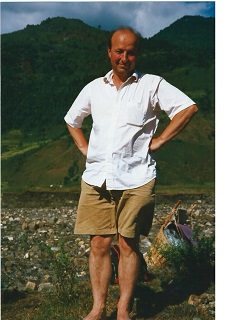 Simon started his love for Nepal as a medical student on his elective with BNMT. His strong affiliation for this beautiful Himalayan country and its people saw his return as field doctor for BNMT in 1980. The days when recently qualified and idealistic Western doctors still roamed the Eastern Hills and were responsible for running the TB and leprosy control programmes in remote district centres. Simon’s commitment and closeness to the Nepali people no doubt helped to establish the respect BNMT enjoys to this day in Nepal.
Simon started his love for Nepal as a medical student on his elective with BNMT. His strong affiliation for this beautiful Himalayan country and its people saw his return as field doctor for BNMT in 1980. The days when recently qualified and idealistic Western doctors still roamed the Eastern Hills and were responsible for running the TB and leprosy control programmes in remote district centres. Simon’s commitment and closeness to the Nepali people no doubt helped to establish the respect BNMT enjoys to this day in Nepal.
The extremely isolated existence suited his striking individuality. Despite being the only Westerner in Bhojpur, he stayed for 3 years, establishing strong relationships with the Nepali staff with whom he worked and the local population. His memory lived on long after he had gone in many stories and in the dhara (water supply) he donated on leaving Bhojpur. After returning to the UK he maintained his links with Nepal and BNMT eventually becoming a trustee; a role he fulfilled for 23 years. His intelligence and wit were always a vital ingredient of the trustee meetings, when not restricted in later years by his tendency for an afternoon snooze!
Initially uncertain which path his medical career should take after BNMT he finally decided on psychiatry. A foray into medical anthropology displayed his significant academic abilities and his original mind. He produced a fascinating PhD thesis (published as a book “Making Doctors”) after embedding himself in a London medical school to try and objectively observe the influences at work in producing British doctors. His insights were revealing; although medical education has changed somewhat since then this would still be useful reading for all medical students.
Whilst still in Oxford he met and married his beloved MA and they started a family. They eventually moved up to Durham as he pursued his career in psychiatry combining clinical and academic responsibilities. As well as his demanding job he was always dedicated to his family and often spent weekends ferrying his children to their commitments, in particular as distinguished choristers.
Happily, he continued to travel South to the Trust meetings until very recently when he retired as a trustee after the diagnosis of his prostatic cancer. The course of his illness was traumatic but he faced it with the courage and realism one would have somehow expected from this unique personality. He will be sorely missed.
